By Tolossa Asrat KANERE Volunteer Writer, June 2021
In Kakuma and Kalobeyei, which host over 200,000 refugees, women and children comprise 76 % of the total refugee population. Of this sum, 49% are women living in dire circumstances which most people would never even wish to visit.

Winnie Achola is a 24 year old refugee from South Sudan and is one of the thousands of refugees who have been forced to flee their homes. Achola now resides in Village 3 of the Kalobeyei Settlement. Kalobeyei, an extension of the Kakuma refugee camps, hosts over 40,000 refugees from different countries of origin and was designed to integrate refugees within the host community. When asked about safety in Kalobeyei, Winnie explained some of her concerns: “Here no days will pass without hearing a gunshot or a scream of a woman calling out for help…but spending the night alone with my daughter was so scary.”
When Achola first arrived in Kalobeyei, it was not hard for her to imagine how stressful and traumatic life would be: “I remember it was too windy and very deserted, like it never rained for centuries.”
Without any support and no opportunities, Achola and her daughter felt unsafe and stressed. She also admits that building a new life was not easy and included many challenges: “I used to spend the nights crying and blame the situations that brought us to this bad environment,” she said with eyes full of tears. “Down inside nothing was ok but I had to be strong,” she added.
However, Achola had strong aspirations to survive and raise her daughter. She found that the biggest challenges for women in Kalobeyei are poverty and sexual violence.
Poverty and lack of income opportunities affect all refugees. In Kakuma and Kalobeyei, for example, recent research on self-reliance by the University of Oxford indicates that refugees living in both the camp and the settlement are far from achieving self-reliance outcomes. The report concludes that very few refugees living in Kalobeyei, at all, can be characterized as self-reliant.
However, women are more likely to face distinct and difficult challenges, including gender-based violence due to camp living conditions.
Living in Kalobeyei was especially hard for Achola as she could not find employment and lacked marketable skills. “I finished form 4, I love singing and I am passionate about telling stories of people and have good sound and I am good speaker too,” she said. She started looking for an income that could buy at least a meal for both her and her daughter.
“As a single mother I decided to do something to support me and my daughter,” she recalls. “So one day I went to the local FM at village one and asked them if they could offer me a volunteer job,” she added.
Luckily, Achola got a call and a month later, she started volunteering at local FM station. However, she only stayed there for three months due to the distance between her home and the office: “I was walking 45 minutes from my village to the station and I couldn’t get anything out of it, but it helped me to meet my current employers.” While volunteering at the station, one day her current employer had a meeting with the station team. At that meeting, Achola had the chance to present her views on certain agenda points: “I stood up and presented my views and I did it well,” she said as she reflected on how the door to her current opportunity opened that day.
Later, Achola joined a journalism training program offered by one of the camp agency in Kakuma. After nine months into the program she got employed as a content generator where she closely work with the refugee communities as an incentive
Achola recognizes that there are many girls out there facing a lot of problems who do not have any support systems or people to talk to. “Some of them ended up committing suicide just because there was no body they could turn to,” said Achola.
However, Achola would also wish to see more critical training opportunities and employment support that could help young women and youths across camps, which says is lacking in the system.
“Agencies should be able to provide more trainings and employment support from their budget but they are not doing enough.” she added.
More skills training centers like this are needed in Kalobeyei and other places as all refugees and displaced women and girls grapple with an immense amount of trauma. They deserve ways out of deep poverty.
More displaced young girls also deserve the possibilities of acquiring life skill training so that they can empower themselves and create opportunities like Achola was enabled to do.
